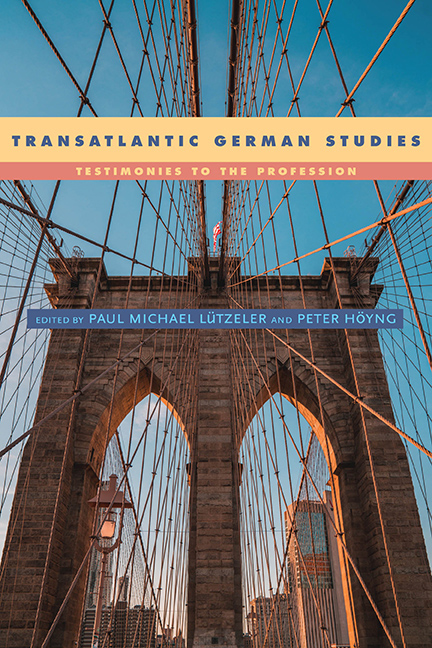Book contents
- Frontmatter
- Dedication
- Contents
- Acknowledgments
- Introduction
- From Erfahrungshunger to Realitätshunger: Futurity, Migration, and Difference
- In-between: The Participant as Observer—The Observer as Participant
- Transatlantic Space and My Own History of Globalization
- Deplazierte Personen: Why Would an American Become a Germanist?
- Metamorphoses and Meanderings of a Wanderer between Worlds
- German Studies as Vocation: My Path into It, Out of It, and Back into It
- My Long Way from Germanistik to Afro German Studies
- Mustang Red: My American Road to Critical Theory
- Third Place: How a French Germanist Became an Applied Linguist in America
- Transatlantic Exchanges: German Studies—European and American Style
- Being at Home in the Other: Thoughts and Tales from a Typically Atypical Germanist
- After Australia: Triangulating an Intellectual Journey
- A Tale in Translation: An Academic Itinerary from Istanbul to Bryn Mawr
- Beyond Passing: Transculturation in “Contact Zones”
- Far from Where? Germanistik between the Continents
- Epilogue: The Usefulness of Useless Studies
- Index
Mustang Red: My American Road to Critical Theory
Published online by Cambridge University Press: 14 February 2019
- Frontmatter
- Dedication
- Contents
- Acknowledgments
- Introduction
- From Erfahrungshunger to Realitätshunger: Futurity, Migration, and Difference
- In-between: The Participant as Observer—The Observer as Participant
- Transatlantic Space and My Own History of Globalization
- Deplazierte Personen: Why Would an American Become a Germanist?
- Metamorphoses and Meanderings of a Wanderer between Worlds
- German Studies as Vocation: My Path into It, Out of It, and Back into It
- My Long Way from Germanistik to Afro German Studies
- Mustang Red: My American Road to Critical Theory
- Third Place: How a French Germanist Became an Applied Linguist in America
- Transatlantic Exchanges: German Studies—European and American Style
- Being at Home in the Other: Thoughts and Tales from a Typically Atypical Germanist
- After Australia: Triangulating an Intellectual Journey
- A Tale in Translation: An Academic Itinerary from Istanbul to Bryn Mawr
- Beyond Passing: Transculturation in “Contact Zones”
- Far from Where? Germanistik between the Continents
- Epilogue: The Usefulness of Useless Studies
- Index
Summary
MY TRAJECTORY IN THE AMERICAN ACADEMY, totally haphazard in its beginning, was always tentative at the time when it unfolded, tentative and contingent rather than somehow logical and telos-driven, as it may appear in retrospective delusion. And it remains tentative and full of gaps now in its narrative formulation. But some facts are not in dispute.
Having studied German and Romance languages and literatures at various universities across Western Europe, including Paris, Madrid, Cologne, Munich, and finally Zurich, I finished with comprehensive doctoral exams in Zurich in early 1969. My reason for choosing Zurich was simple: Romance literatures were taught there in the target language, not in German. My dissertation advisor was Emil Staiger, my main mentor in French literature the phenomenologist Georges Poulet. Paul de Man had a partial appointment in Zurich and lectured on Rousseau at the time. Among us graduate students, methodological and political issues had begun to surface, even in Zurich, by 1967/68. We read Hildegard Brenner's alternative, not the PMLA. The glaciers of traditional Germanistik and Romanistik had begun to melt. My still very traditionally framed dissertation on German romantic translation theory and the utopia of a German world literature was rejected for publication by Peter Szondi in his then new book series published with Metzler, but enthusiastically accepted by Staiger and published in his Zurich dissertation series, the Züricher Beiträge. In retrospect I have to say: Szondi was right. The dissertation would have needed serious revisions and a sharper theoretical focus.
So there I was—Zurich, spring 1969, 26 years old. The Beatles told me: “Get back to where you once belonged.” But having finished my studies outside of Germany with only five early semesters of study at German universities, re-entry into the German academic world seemed difficult. An inquiry in 1970 with a famous Heine scholar in my hometown Düsseldorf would put the idea to rest forever. “If you're globetrotting the world, as you do, you cannot expect to be taken in just like that by a German university,” he said. “Unsere eigenen Studenten sind uns dann doch näher.” Plausible, but strange coming from a Heine expert.
- Type
- Chapter
- Information
- Transatlantic German StudiesTestimonies to the Profession, pp. 124 - 143Publisher: Boydell & BrewerPrint publication year: 2018

